LWRC Tricon MK6–The Refined Fighting Carbine
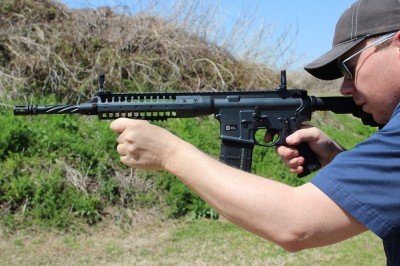
The shorter barrel allows for a compact package, but it isn’t short enough to need SBR paper work.
Before we get into the meat of this review, I’d like to throw this
out. LWRC is currently having a promotion: buy an LWRC, get an
Aimpoint T1 and a mount (reviewed here).
If you’re not familiar with the Aimpoint red dot, it is tiny. The
optics are rugged and an ideal option for tactical rifles. There’s more
on the contest below, or you can follow the link:
Aimpoint T1 offer:
https://www.lwrci.com/aimpointpromo
Tricon MK6:
https://www.lwrci.com/tricon MK6
Buy one:
http://www.gunsamerica.com/LWRC Tricon MK6
Alright. On with the review. And let me be completely
transparent–I’ve been looking forward to this review for a long time
now. For those of you reading this who may not know any gun writers
personally, there is a growing
too-cool-for-school attitude
that is dominating the industry. I’ve seen writers who review capable,
reliable guns come away with the “ho-hum, its okay” stance. To hell with
the hipsters. If it works, I’ll tell you. And I’m not going to pretend
I’m not awe struck by what LWRC puts together. Every year at the SHOT
Show, I hit their booth and stand around for an hour or so handling
rifles I know I’ll never actually own.
So when a Tricon MK6 arrived at my FFL with my name on it, I was kind
of giddy. I’ve taken the rifle with me to the range for a couple of
months. Every time I work out another gun, I put the MK6 up against it.
My own AR, the typical Frankenstein’s Monster style AR built over
several years, looks pretty crude in comparison.
And that’s where we’ll begin the deep thinking of this review. The
Tricon MK6 is an expensive rifle. I’ve seen the gun for sale anywhere
from $2,200+ to $2,500. While that isn’t out of line for a select group
of high-end AR makers, it will seem high to anyone who is accustomed to
entry level black rifles.
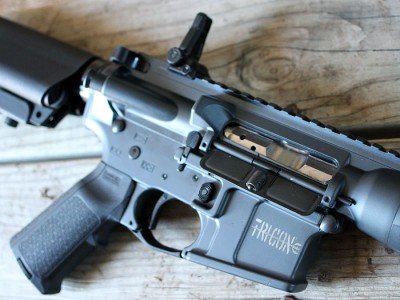
The Tricon logo is not terribly large, but it is present on the mag well.
Do you get what you pay for?
Some guns exist in a category all their own. If you want a GLOCK 43,
for example, you buy a GLOCK 43. You could argue that it is a 9mm single
stack, and that the 9mm single stack pistol is its own genre, but each
gun made by each manufacturer is unique. The .45 ACP 1911 may be a
better analogy, as there are (how many–hundreds?) of companies making
the 1911, and all are working off of the same basic blueprint. Yet,
despite the gun’s modular origins, you can’t always mix and match parts.
The AR-15 is different. It may be worth noting that the AR-15 moniker
was once a proprietary trade name, and that many who work in the AR-15
idiom give these rifles their own nomenclature. But they’re still
recognizable branches of the Stoner Family Tree. And almost all of them
are still designed with modularity in mind–which makes it even harder to
differentiate them from each other. If they all have to share parts,
they have to be
really similar.
So why the broad range in prices? At the end of 2014, I saw ARs on
sale for less than $500, lots of them. Perfectly serviceable rifles with
great components regularly sell for under $1,000. So what
differentiates a $2,500 AR from the rest of the black rifle market? Why
should you buy one LWRC instead of 5 others?
Value is a complicated nut to crack. There’s no question that LWRC’s
guns exist on a plane above the run-of-the-mill black rifle. You can
glance at the Tricon MK6 and see some of the differences. There are some
aesthetic nuances that make the LWRC guns unique. There are some
performance based modifications that fit into this equation, too, though
the AR-15’s reputation for reliability leaves a narrow window for
improvement. So what else?
Lets get into this build
LWRC worked with Jeff Gonzales, a former SEAL who leads the
instruction at TRICON (Trident Concepts), to develop this rifle. There
are several features on the gun that are slight modifications of the
typical LWRC set up, and all come together in a unified package. If you
want to learn more about what sort of training Gonzales offers, check
out the Tricon school here:
http://www.tridentconcepts.com/weapons-training/.
This isn’t your average, run-of-the-mill intro carbine line-up. It is
built on the M6 Individual Carbine platform, but has some custom
features.
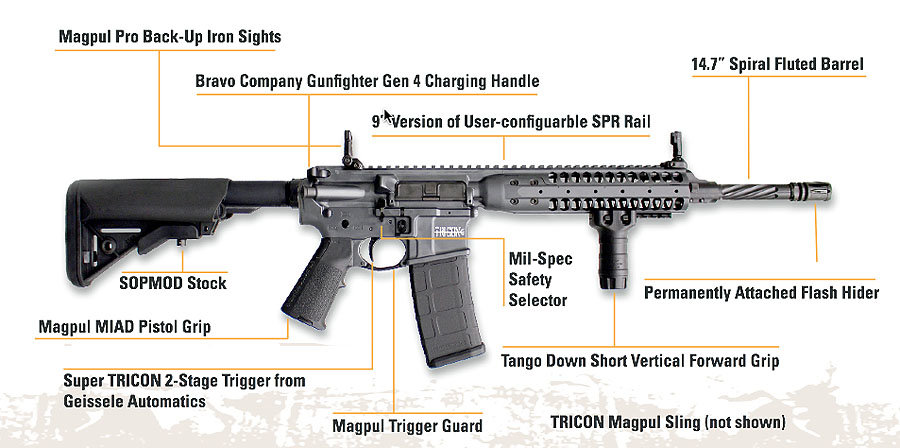
LWRC’s own promotional materials spell out some of what makes the Tricon unique.
The most visually distinct aspect of this rifle would have to be the
fluted barrel. Barrel fluting reduces weight while leaving enough
material for structural integrity. It also provides more surface area on
the steel, which helps dissipate heat. In this case, the barrel has
been cut to below the 16″ mark, and the flash hider has been permanently
affixed to get it up to a legal length.
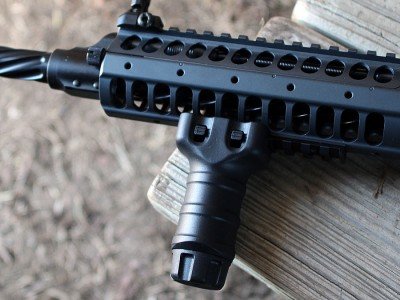
The rail can be configured as you’d like, but comes with a Tango Down fore grip.
The rest of the details all feel both coordinated and intentional.
This is a defining feature of guns in the higher price range. Most low
priced builds cobble together stand-in parts. Everyone knows that you’ll
buy an entry-level AR and immediately begin swapping out parts. By the
time you’re done, your AR will have as many original parts as Darth
Vader. And the price tag for the after-mod version would be staggering
if you had to pony up for everything all at once.
The Tricon MK6 is built with a lot of Magpul components. From the
mags to the sights, almost everything that can be made by Magpul is. The
sights are worth mentioning. These are the MBUS Pros, and made of
steel. The slim profile looks sharp, and the steel construction makes
them even more rugged than the original MBUS design.
Geissele’s two stage trigger is also a fantastic upgrade over what
you’d find on a base model. There’s no comparison between it and a
typical milspec trigger.
In the end, the components are rock solid. LWRC’s chosen
configuration combines to make a very functional rifle that, all told,
would cost less to buy in this configuration than if you went out and
added all of these parts to a cheap AR lower. Reliability should be
taken as a given, but the way it works–again subtle–is worthy of a
closer look. Check out the controls. This is one area that a lot of
folks begin modification. The LWRC guns come ready.

I’m
a big fan of these controls. It is one of the first things I usually
change on any AR that I use frequently–but these are all easy to index
and reach. But the mag release is the best.
What do you give up?
Well, this one is harder to answer. The first sacrifice I see comes
at the expense of the pinned flash hider. 14.7″ of barrel instead of
16″? I understand the impulse, but I think the reality of this decision
is hard to justify. As the AR platform is built on modularity, I want to
be able to choose the right muzzle device. I still can, but it is a
pain in the ass. And using a suppressor is also much more complicated.
Not impossible, by any means.
This is a gun you accept on its own terms. At least that’s how I see
it. If you like the mix and match jigsaw puzzle sort of AR build, you’ll
be frustrated the Tricon. From the short piston gas system to the way
the rail fits on the forend, down to the slate grey finish, so much of
the Tricon is meant to fit and function just exactly as it is. Don’t get
me wrong–the way it is works exceptionally well.
Take the slate grey finish and the short barrel. While neither of
these would be choices I’d make personally, I like them both. You can
travel with this gun without any paperwork hassle. For urban settings,
where there are vehicles and doorways, the short barrel would be useful.
And the grey color is very adaptable for urban environments. It
disappears in darkness, and looks a bit like wet asphalt. So it all
comes down to interpretation, and intended use.
Shooting
I guess this is where everything comes together for me. I’ve put
thousands of rounds through ARs, and I’m accustomed to respectable
accuracy. The Tricon performs a bit better than that. Groups at 100
(from the bench) were one ragged hole. The barrel didn’t seem to be as
prone to heating as many. The short rail works for me, only because of
the foregrip. The balance is excellent. The controls are perfect. I’ve
shot the gun in sub freezing conditions, in snow and in rain, clean,
dirty, and with every flavor of 5.56 and .223 I can get my paws on, and
there has yet to be a hiccup. The piston keeps the guts of the upper
from fouling as fast. And I feel like it dampens the recoil in a
positive way, though I can;t support that scientifically. What I will
say is that the rifle shoots flat. And fast.
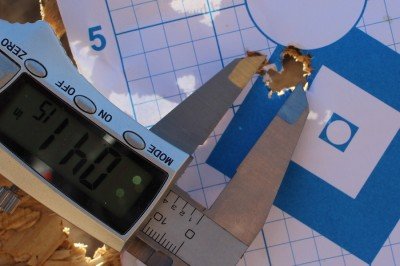
100 yards, from the bench.

With a Burris 1-5, the real potential of the gun becomes evident.
Conclusion
The Tricon MK6 is a limited edition from LWRC. In many ways, they’ve
taken what is, for many, a cost prohibitive level of perfection and made
it even more exclusive by producing a small number of guns. I don’t see
that as a bad thing. These same features are available on the other
guns in the LWRC line-up. And more. I’d like to have the option of an
adjustable gas block, as I’m always entertaining the idea that I may
want to run a 5.56 suppressed. And I’m not opposed to either longer
barrels or shorter barrels.
But this is one hell of a package. The component parts come together
exactly as they should. It clearly isn’t the rifle that I would have
built if I had access to the workshop, but it is a beast. This is a
rifle I didn’t know I needed until after I worked with it for a bit. The
LWRC components stand a cut above those of the competition. The
resulting rifle is as fine an example of the AR-15 as I’ve ever seen.
And I’m not just blowing sunshine up LWRC’s gas tube. This gun is the
shit. In fact, there is only one black rifle that I’ve shot that I liked
more–and it, too, was from LWRC. It is the Xiphos SBR pictured way down
below.
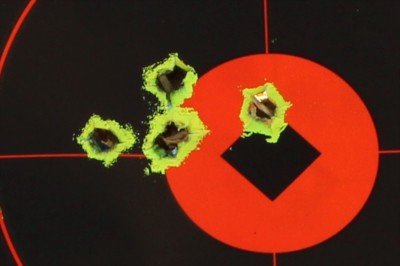
Accuracy with the irons is solid.
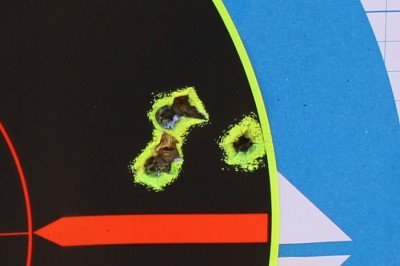
Even at 100 yards, I could group well (and really close to point of aim).

All AR-15s should shoot like this. This was the worst of our test groups, and it was shot with Tula.
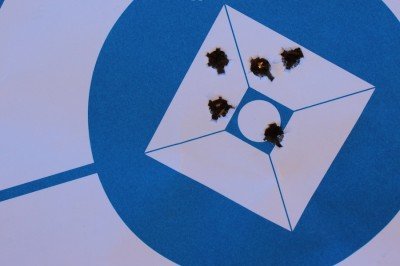
100 yards, standing.

Again, I’ll stress first impressions. When I see fit and finish like this on a rifle, I have high expectations.

The
gun is short enough for maneuverability, but long enough to feel like a
carbine–a good option for those who don’t cotton to SBRs.
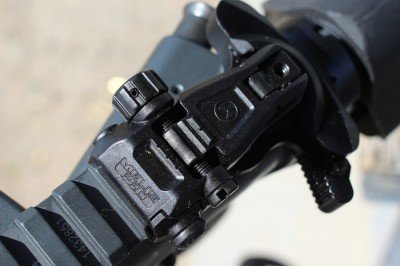
The MBUS Pro sights are steel, and very nice.
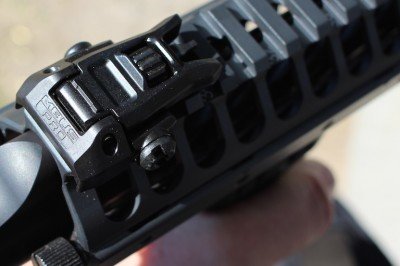
The sights.
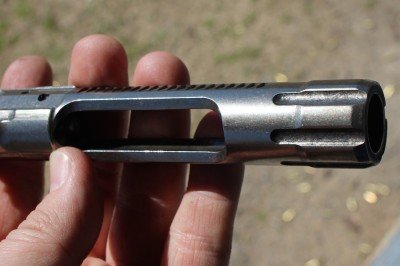
The bolt carrier group
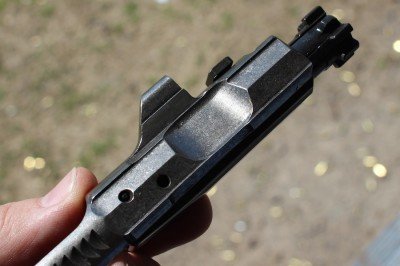
Built for the piston.
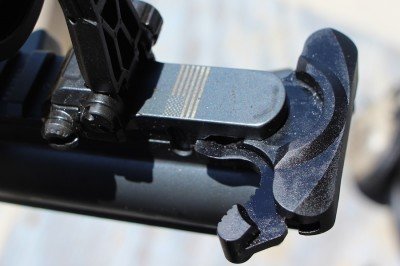
The BCM charging handle is huge, and easy to find.
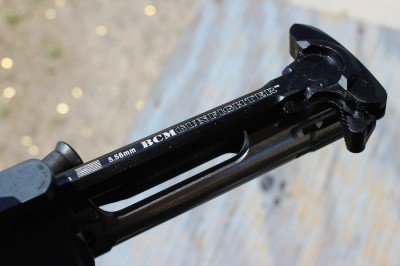
BCM Gunfighter.
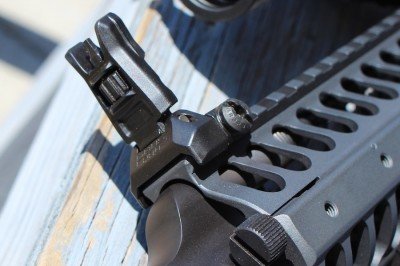
The front MBUS.
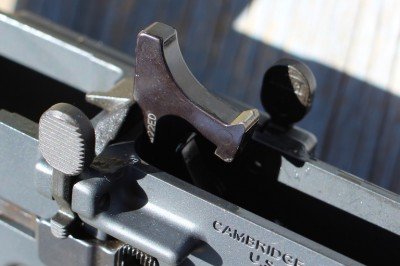
The hammer.
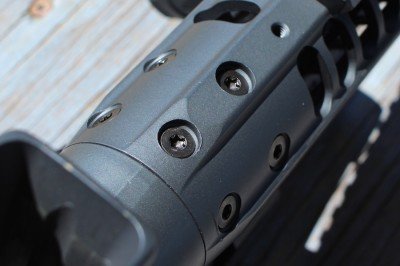
The forend is bolted on. Very well.
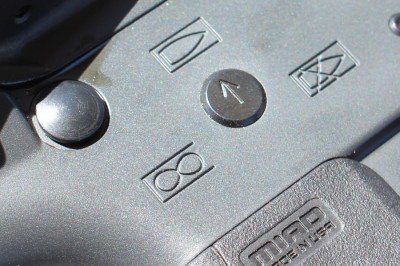
The safety is easy to read from both sides.
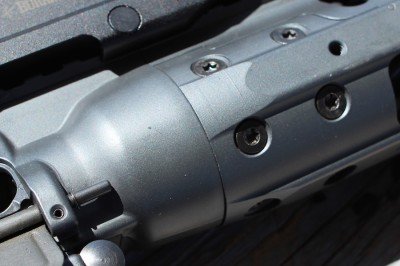
The transition from the upper to the receiver is well crafted and more streamlined than most.
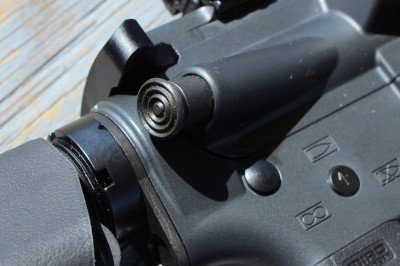
Like most, it has a forward assist.
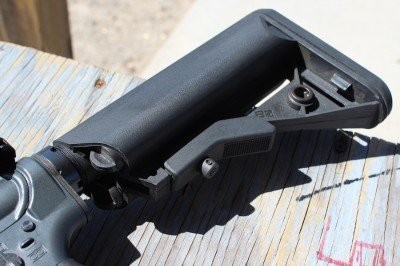
The Magpul stock.
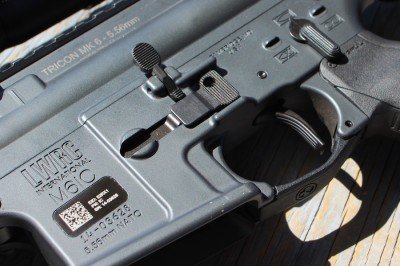
Even the trigger guard is Magpul.
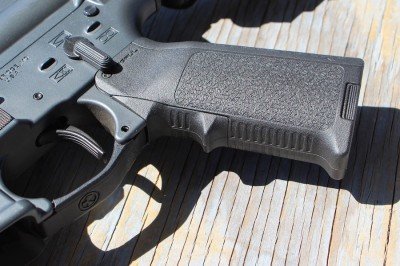
Again… Magpul.
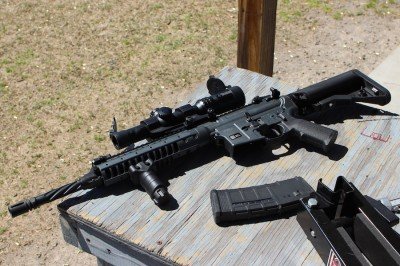
The Burris on the MK6. It is a large 1-5, but incredibly effective.
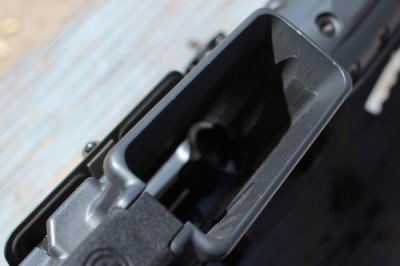
The mag well is flared and easy to find.
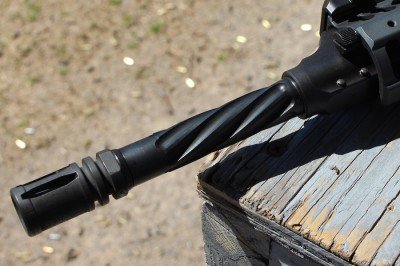
The fluted barrel reduces weight.
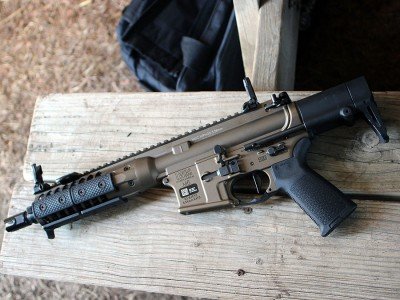
The Xiphos SBR I like even better than the TRICON.
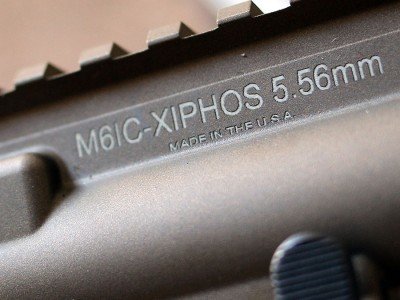
Same platform, different interpretation.
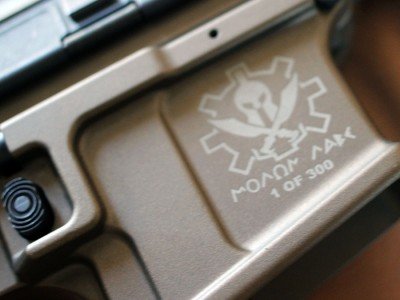
Come and take it.
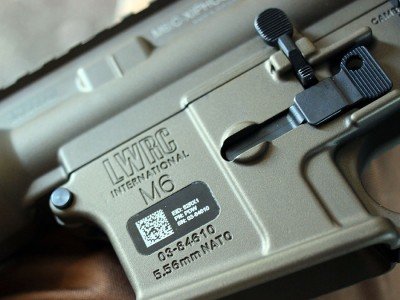
Same controls. Maybe I need both of these.
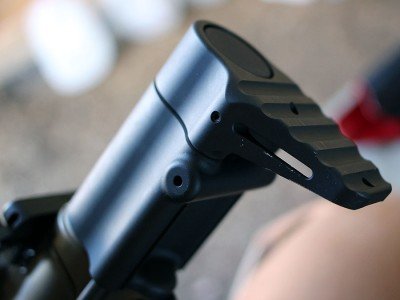
And I’m a sucker for the super short stocks.

The
piston system rides under the rail, and it works. Some see it as
one-more-thing to break on an AR, but I’ve yet to find fault with it.
